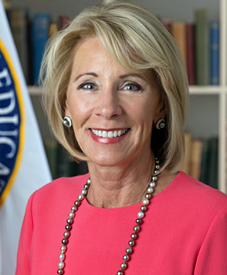New Title IX regulations give more rights to college students accused of sexual misconduct

Education Secretary Betsy DeVos/U.S. Department of Education.
Final regulations issued Wednesday give college students accused of sexual misconduct additional due process rights, including include the right to a live hearing with cross-examination.
The regulations, set to take effect Aug. 14, apply to student sexual harassment allegations at schools that receive federal financial assistance. The rules define harassment to include sexual assault, dating violence, domestic violence and stalking.
Sexual harassment is otherwise defined narrowly to be “unwelcome conduct on the basis of sex that is so severe, pervasive and objectively offensive that it effectively denies a person equal access to the school’s education program or activity.” Previous guidance by the Obama administration had defined sexual harassment more broadly as “unwelcome conduct of a sexual nature.”
A press release is here. The New York Times and the Washington Post have coverage.
Education Secretary Betsy DeVos issued the regulations after rescinding the Obama-era guidance, issued in a “Dear Colleague” letter, which discouraged cross-examination and encouraged schools to decide claims using a “preponderance of the evidence” standard.
The new rules allow schools to choose between the “preponderance of the evidence” standard or a “clear and convincing evidence” standard. The standard must be stated in the school’s grievance process, and it must be consistent with the standard that the schools use to decide complaints against school employees and faculty members.
In colleges, the grievance process must provide for a live hearing, although parties and witnesses may appear virtually at the school’s discretion. Under the old guidance, schools sometimes suspended or expelled alleged offenders based on findings of an investigator, without any formal hearing.
Cross-examination is allowed in the hearing, although the questions must be asked by advisers to the parties, rather than the parties themselves. If a party doesn’t have an adviser, the college must provide one, although the adviser does not have to be a lawyer.
During cross-examination, a hearing officer must determine whether a question is relevant before it is answered.
Questions about an accuser’s past sexual behavior are deemed to be irrelevant unless offered to prove that someone other than the accused committed the alleged misconduct or offered to prove consent.
Live hearings are not required at the kindergarten through 12th grade level. Whether or not there is a hearing, the parties must be given the investigative report and a chance to respond before a determination is made.
The regulations require schools to respond to reports of sexual harassment made to a Title IX coordinator or an official with authority to take action.
Two House Democratic committee chairs issued a statement saying the new rules create “new barriers to justice for survivors of sexual misconduct.”
The rules require schools “to address only the most severe and pervasive forms of sexual misconduct,” said the statement by House Judiciary Committee Chairman Jerrold Nadler of New York and House Education and Labor Committee Chairman Bobby Scott.
As a result, they said, “institutions may now be permitted to overlook many instances of harassment that they were previously obligated to address.” Schools will be found in violation of Title IX only if they are “deliberately indifferent” to complaints, they said.
One critic who vowed to challenge the new regulations is Emily Martin, a vice president at the National Women’s Law Center.
Martin told the Washington Post that the challenge will contend that the Department of Education was “arbitrary and capricious” in enacting the regulations and did not take into account evidence that the rules would harm survivors of sexual violence.
Write a letter to the editor, share a story tip or update, or report an error.


